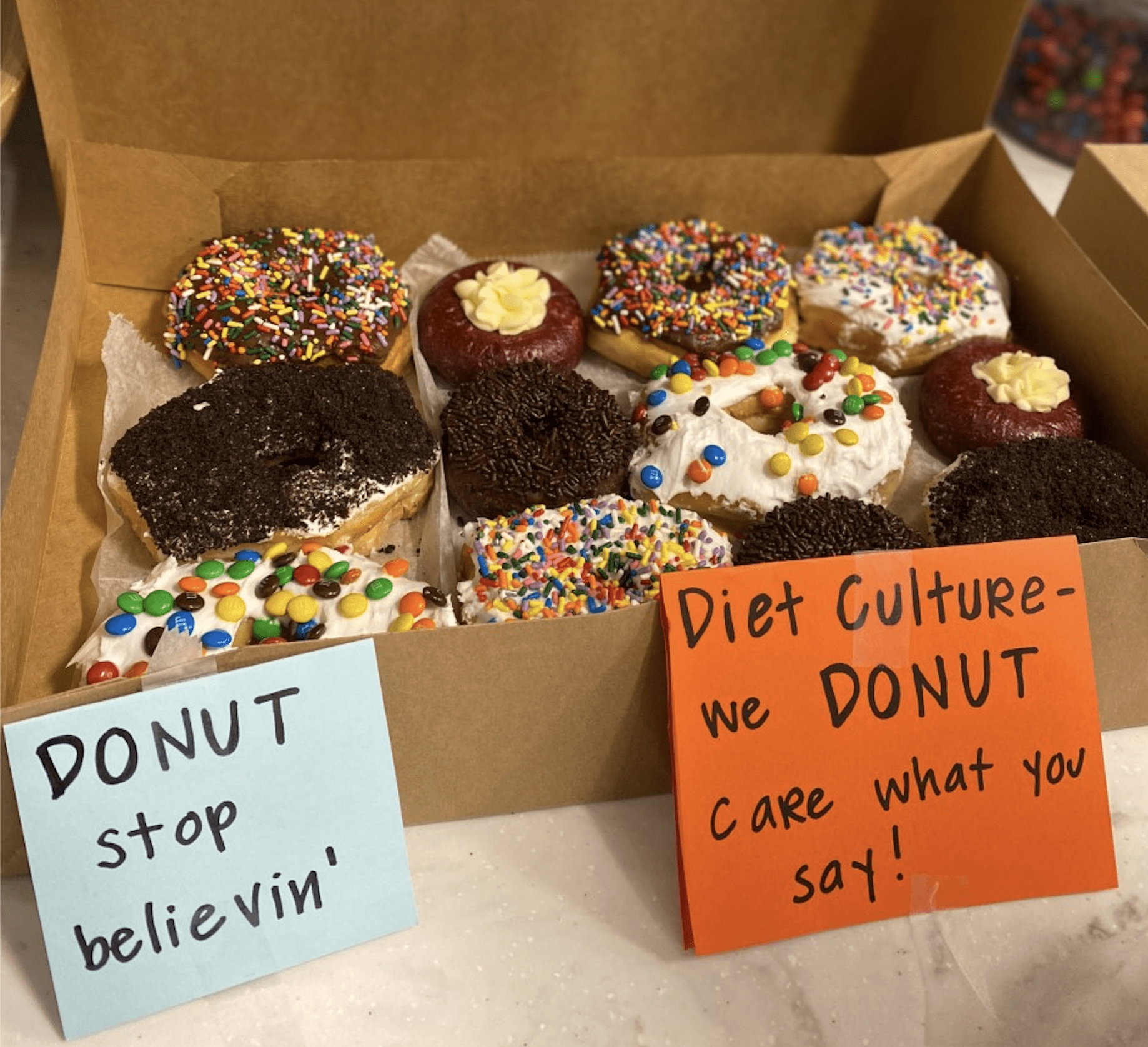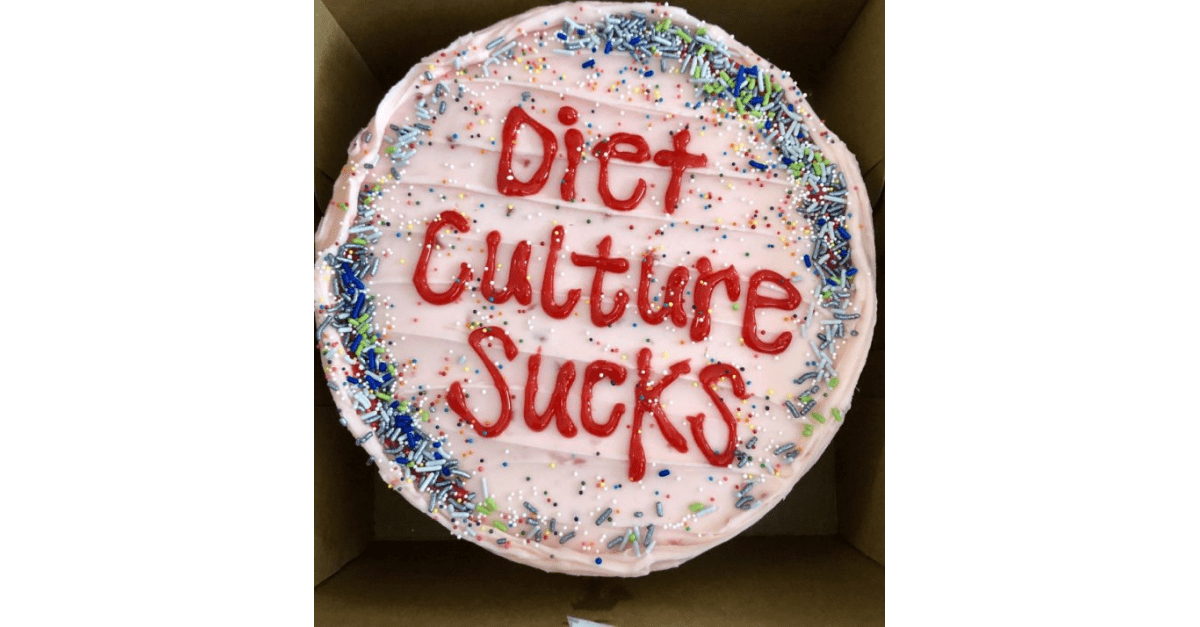Alsana’s Response to Diet Culture & Weight Stigma
Standings Against Diet Culture & Cultivating Body Acceptance
You might also be interested in:
Diet Culture: What is it?
Diet culture is a thief of health, life, and joy that lives in comparison, not truth; it is a food and body belief system that has saturated western society. It leads to food-distrust, body-distrust, body marginalization, and oppression.
Christy Harrison, MPH, RD, CDN a well-known anti-diet registered dietitian, nutritionist, author, and certified intuitive eating counselor describes diet culture as having these features:
- Worships thinness and equates it to health and moral virtue, which means you can spend your whole life thinking you’re irreparably broken just because you don’t look like the impossible thin “ideal”
- Promotes weight loss as a means of attaining higher status, which means you feel compelled to spend a massive amount of time, energy, and money trying to shrink your body, even though the research is very clear that intentional weight loss fails more than 95% of the time
- Demonizes certain ways of eating while elevating others, which means you’re forced to be hyper-vigilant about your eating, ashamed of making certain food choices, and distracted from your pleasure, your purpose, and your power.

We Oppose the Diet Industry that Profits Off False Promises
We push back against the $73 billion diet industry that profits off peoples’ desire for weight-equating health, belonging, and acceptance while selling something inherently defective and harmful.
Dieting is ineffective for sustained weight loss; nearly 95% of individuals regain the weight they initially lost within a one-to-two-year follow-up, while approximately one-third of those individuals end up weighing more than when they began dieting. And yet, individuals keep in the cycle of body changes that are not sustainable. The pattern of weight gain and weight loss, called weight cycling, is more harmful to one’s physical and mental health than maintaining stable higher body weight. What other product and industry with a 95% failure rate continues to rake in billions each year? This speaks to the strength of diet culture and the messages it sends about our worth, acceptance, health, and privilege.
The diet industry comes with the illusion that we could be “good enough” if we spend enough money, follow its’ externalized food/exercise rules, and deny our body’s innate cues to nourish ourselves in meaningful ways. Diet culture offers a bag of false promises -not only in physical health but also in mental, emotional, and relational health- that leaves individuals on a roller coaster of inflation and deflation tied to food consumption and body shape.
We Fight Weight Stigma As Well As Racist, Sexist Beauty Standards
Diet culture amplifies weight stigma in every realm of society. Individuals are treated as less-than and stereotyped based on their body’s appearance. People in larger bodies often have their health concerns dismissed because healthcare workers often assume many health problems are owed to weight. These hurtful assumptions and oppression lead to poor mental health, shame, increased insecurity, potential eating disorders, depression, and anxiety. Weight stigma also has adverse effects on physical health due to individuals avoiding the health-care system in fear of continued weight stigma and marginalization. Internalized weight stigma leaves individuals reaching to adjust eating and exercise to manipulate their bodies to avoid the effects of weight stigma. Thus, the cycle continues.
Physical ideals are not surface level concepts, nor are they new. The origins of diet culture’s body ideals, weight stigma, and fatphobia, are deeply rooted in racism and sexism. When we take a stand towards body inclusivity, we are taking steps towards human equality- not just in body, but race and gender equality.
At Alsana, we fight against weight stigma by celebrating body diversity and, through structure and intuitive eating principle work, offer a pathway towards the internal body and food trust.
We celebrate body diversity. We believe all bodies are good bodies, independent of size, shape, gender, physical ability, race, age, et cetera. We strive to ensure a body-inclusive, body-celebrated environment through our language, shared spaces, and relational approach to body discussions.
We celebrate brave steps towards full, autonomous agency and permission with food and work to support healing the relationship with food. As eating disorder professionals, it is not our job to make someone eat or act in a particular manner. It is our job to be authentic and to stay present with our clients in the trenches, offer alternatives, and guide them toward internalized permission/agency and shame reduction.
“Normal Eating” Looks Like Different Ways of Eating at Different Times for Different People for Different Reasons.
“Normal” eating is not a pretty little black-and-white, well-defined, moralist box to check. It looks different for each person, in how they make peace with eating and food. Making peace with food is often less about the “what” of eating and more about intention and motivation in eating.
Eating in a manner that is body-attuned, honoring our emotional and physical needs, is countercultural. When we create permission to experience the pleasure and enjoyment of food not motivated by diet culture, we take part in a quiet revolution that’s growing louder every day. We are stepping out of an externalized body-controlling culture, and stepping into body-autonomy, reconnecting to our bodies that have carried us our whole lives.
Diet culture has compromised one of our most sacred relationships: the one we have with ourselves. Many of us have lost trust in our bodies, and our ability to make mindful, nourishing (mentally and physically) food choices. Being bombarded with mal-adaptive, external systems of food rules and perpetuates this distrust, and we must push back to find peace.
Diet culture makes people feel like they are doing something wrong when they listen to their bodies and desires by using shame as a key motivator for food choice; it says food is something to be earned through exercise, fasting, or achieving a specific weight or body shape.
Having enough food is everyone’s right, as is our ability to build our relationship with food.
Sometimes we eat because we are hungry, and sometimes we eat because we just want to. Sometimes eating fills a physical need, but sometimes it’s about connecting with something else!
The aroma of your gramma’s cookies; the chicken soup your dad brought you when you were sick; the root beer float you have on your virtual friend date because that’s what you used to make in college together; the pizza you wanted just because it sounded good and because responding to cravings mindfully doesn’t require justification or a reason. Diet culture says we don’t need those things and that we are bad or weak if we want them. We disagree.
We honor the physical nourishment and pleasure of food, as well as its ability to connect us to our culture, to our planet, and our own deep cravings. We embrace the emotional and relational nourishment and pleasure that comes from food. Diet culture would have us throw all of that away, offering us less than nothing in exchange for our willpower, our hunger.

Replacing Diet Culture With Compassionate Community
We hear you, we see you. Being anti-diet doesn’t mean we are anti-dieter. We have great compassion for every individual who feels the pressure of diet culture, and we want to help them see food through a new lens. The path out of diet culture is steep and can be painful, but we promise that it is healing, worth it, and not something you have to do alone.
We want to know clients’ deepest longings, yearnings, anxieties, wounds, and desires with food. We understand that some dieting behaviors provide harm mitigation in the shorter term and may have served as life rafts, as a means to survive in a weight-stigmatizing world. We want to explore what clients’ eating histories represent and the narratives they’ve internalized about bodies and food. We hope to sit alongside each individual, hear their story, build a shared understanding, and support a path towards healing one’s relationship with food and their body.
This work can not be done alone. We are grateful for those who have laid the foundation before us. We strive to continue building a community that is body inclusive, anti-diet-culture, to be a part of a growing, powerful movement against weight stigma.
We Fight for Change like the Fat Activists that Came Before Us
Our lives are immeasurably better because of those who have fought weight stigma and diet culture before us; we vow to continue that work for those who are here today and those who will come after.
We celebrate the fat activists that have laid the groundwork before us. We stand on the shoulders of the brave activists and body acceptance pioneers that have been advocating for body diversity and body-liberation at least since the 1960s.
Sometimes good people get it wrong. We have compassion for people who are entangled in some aspect of diet culture, as many of us have been ourselves at one time in our own lived experience. Diet culture is designed to ensnare. We hope to bring compassionate education to those around us.
And last but not least, we celebrate and admire the bravery and persistence of our clients. Every day they journey a little closer back to the center of themselves and away from diet-mentality and shame. We are honored to be a part of their story and to witness the resilience it takes to heal from, and return to, a diet-saturated, weight-stigmatizing world. You all are our greatest teachers, and we stand beside you.

We Are Here to Help
Speak to a masters-level assessment specialist for guidance & support Monday–Friday from 6 am–6 pm (PST).

Virtual Treatment Options
Meeting each client where they are on their recovery journey. Virtually.
Our Recommended Articles
Start the road to recovery with Alsana.

Amy-Claire is a non-diet, HAESⓇ informed dietitian and the Director of Clinical Services for Alabama’s Residential program. She holds CEDRD specialized certification for eating disorder expertise, and has exclusively practiced in eating disorder and sports nutrition realms of dietetic practice for the past seven years, working in outpatient and residential levels of care…








